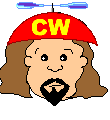|
|
|
Special Focus:
"Dollars and Whys"

ASmithJr explaining the economy to cyranojoe
|
This week's special focus is an interview of ASmithJr, local economist, by
cyranojoe. ASmithJr talks about Whyville's new economy and what's good about having money.
Q: Hello, Mr. Smith.
A: Hi, cyranojoe. Call me Adam. I chose my login after the name of one of hi
story's most famous economists, Adam Smith.
Q: Interesting. Well, Adam, let's start with the most obvious question: what
is this economy thing I keep hearing about?
A: Technically, an economy is defined as being a system that organizes product
ion, distribution, and consumption. That's a long way of saying, an economy i
s how people figure out how people make money. There's all sorts of theories
about it, but the most successful economy seems to be the capitalist one, whic
h is why that's what we have now here in Whyville.
Q: But why do we need an economy in the first place? It seems to me we were doing fine without it.
A: Oh, but this is the neat part! With an economy, the people who participate the most in the community make the most money. The more you do, the more money you'll get. This should make everybody want to get really involved in Whyville, and that improves everything for everyone.

by cyrano
joe
Times Staff
|
Q: So, to make money, all I have to do is participate in Whyville--something I would normally do anyways? Cool!
A: That's it. Do all the activities you can, and logon every day of the week. You can find out what your daily salary is by going to your ledger.
Q: That reminds me, what's a ledger anyways?
A: A ledger is an accounting book. It's where you figure out what you've spent and what money you're making, past and future. It'll make even more sense once we finish the additions to the ledger, hopefully this week.
Q: Additions? What sort of additions?
A: Well, we're aiming at keeping it simple, but giving lots of information, by splitting things up to three separate pages inside the ledger. You'll be able to find out the history of your income and what you've spent. We're also doing some minor editing, moving the one-time bonuses to another page in the ledger. To get help with the new changes, check out Bigfoot Bill's column about using your ledger.
Q: Yeah, that's a good article. Now, I heard that when more people start coming to Whyville, this economy could start to have trouble. Is that true?
A: Actually, yes. More people will mean more salaries, which will mean more money becoming available. If we're not careful, that will bring about inflation, which means that the prices of goods go up while the value of a dollar goes down. This can get really bad -- in Germany after WWII, the price of a loaf of bread got to be millions of Marks. Before the war, it was only two or three Marks.
Q: Wow! That's incredible!
A: Yes, but luckily here in Whyville we can counter that effect by doing a couple of things. One is increasing the number or the price of goods; that is, when the amount of money and the amount of things you can buy stay equivalent or equal, you can escape inflation. They couldn't do that in Germany, because they'd used up all their materials but had too much money around.
Q: What's the other thing you can do?
A: Well, soon we'll turn over the new stores to the regular citizens of Myville. By the principle of laissez faire, this will enable prices to respond more accurately to changes in the economy.
Q: Fascinating. Well, thank you very much, Frank. This has been a very interesting talk.
A: You're welcome. And look for me at the bank, whenever we get it built.
|
|